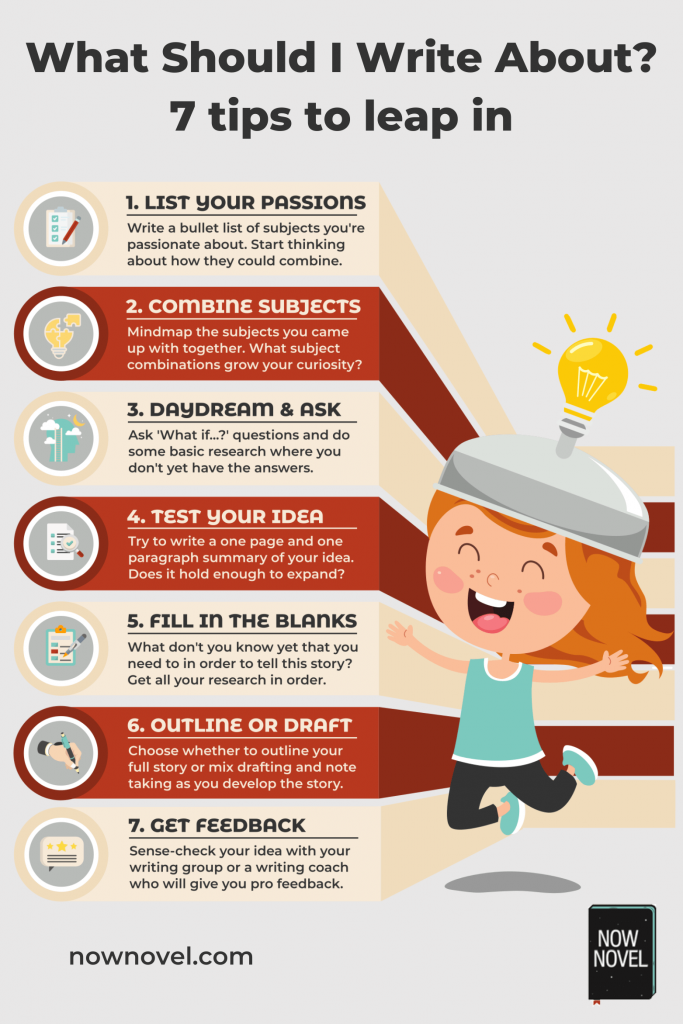Are you wondering, ‘What should I write about?’ these tips will help you leap in and find ideas for a story and sketch scenes to expand it:
7 ways to find ideas for what to write:
- List your passions to find story potential
- Combine fascinating subjects
- Daydream and ask hypotheticals
- Test your idea for expansion
- Fill in the blanks
- Outline further or draft scenes
- Get feedback to check your idea
1. List your passions to find story potential
Should is perhaps the wrong word.
Start by asking ‘what could I write about?’
Do you have specific passions, hobbies or specialist knowledge?
Brainstorming ideas out of your existing interests is a helpful way to find story projects that will continue to interest you. As a bonus, they’ll likely be pleasurable to research, too. Because you’re not just writing about the subject for the sake of it.
Write a simple bullet list of at least 3 of your interests. This is the first step in Now Novel’s Central Idea tool (try it for free).

2. Combine fascinating subjects
In the above example taken from the very first steps of Now Novel’s outlining tools, we’ve written three hypothetical starting-point subjects that begin to answer ‘What should I write about?’:
- Music
- Egyptology
- Unexplained mysteries
Take your own favourite subjects and mindmap ideas about each, keeping the other two subjects in mind and connecting where possible. It doesn’t matter if you cover just two and not all three, for now.
For example, you might ask yourself questions such as:
- What musical instruments were played in Ancient Egypt?
- What roles did music have? (Ceremonial/cultural/other)
- How could a story set in present-day Egypt bring in mysteries surrounding the past and music/musicians specifically?
Combining ideas, you come to a later step in the brainstorming process:
3. Daydream and ask hypotheticals
Giving yourself freedom to play and invent is vital to breezy brainstorming.
As you finesse your broad subject interests and find the many questions that ripple out from them, ask more questions. Get more detailed.
Get more hypothetical, daring to daydream.
This is a good point to do cursory research.
For example, you might Google ‘music in ancient Egypt’. Include ‘.edu’ in your search (to ensure the information sources you find are more reputable and education-oriented).
In this case, you might land on this page from the University of Michigan, discussing Ancient Egyptian musicians and their roles.
This quote gives ideas for hypothetical or ‘what if’ questions:
Professional musicians existed on a number of social levels in ancient Egypt. Perhaps the highest status belonged to temple musicians; the office of “musician” (shemayet) to a particular god or goddess was a position of high status frequently held by women.
‘Music in Ancient Egypt’, available via University of Michigan’s College of Literature, Science and the Arts
Expanding on this information, you might ask:
- What if a shemayet heard the voice of their God during a ceremonial performance, describing an impending calamity, and nobody believed them?
- What if I told the fictional autobiography of a shemayet, from childhood to their final years under the most powerful pharoah of their age?
Repeat this process until you have options. You’ll know you have enough when your thinking shifts from ‘What should I write about?’ to ‘Which of these ideas do I love the most?’

4. Test your idea for expansion
There’s a reason one of the final steps in the Central Idea process is to write a more expansive summary of your story idea.
This process helps you determine if your new idea is indeed what you should write about. You begin to see what there is to expand upon.
At this point it’s helpful to begin to create character profiles too, as a discovery process.
For our made-up MC, shemayet Khepri, you might ask:
- Who is this woman, this personal musician to a god or goddess?
- What are the central conflicts in her life?
- What obstacles does she face in her rise to her temple position?
- How might she change over the course of the story?
Exploring potential goals and obstacles for a still-hazy character early is helpful.
It supplies a solidifying idea of who this character is. What they want. Whether their tale can sustain a longer narrative.
As an exercise, try to write ten quickfire chapter summaries based on your idea. (It doesn’t have to be the arc of your final story.)
For example:
- Chapter 1: Shemayet Khepri plays the sistrum (a rattle-like instrument) and sings, when she hears a voice out of the blue and nearly drops her instrument in shock.
- Chapter 2: We see the first encounter Shemayet Khepri had with an important muscial mentor, and discover the dynamics between members of Khepri’s household. We learn about a significant shock or obstacle Khepri had to overcome young.
Keep going until you have ideas (you can also create scene ideas in the Now Novel Scene Builder and later organize these into scene groups and re-order them as needed).
5. Fill in the blanks
Part of the fear of starting a story is discovering gaps you don’t know how to fill.
You may at this stage have a dim idea of your character, key events in their life.
To continue the example of temple musician Khepri, what if you don’t know anything about how temples were run, or customs surrounding spirituality in your setting or time period?

Use every available resource to find additional, authoritative information.
Don’t be afraid to invent and depart from history now, if there is a historical element to your story. You can always convert your historical setting into a fictional one, if necessary.
Make this process quickfire. You can check for accuracy later (or an editor can, making your task easier).

The question ‘What should I write about?’ often develops to become ‘What do I need to learn to be ready to write this story?’
6. Outline further or draft scenes
Once you have a full idea of what you could write about, decide whether you want to:
- Work on a full outline until you have a map of your story. You may find that outlining is too confining and you prefer to mix light scene outlines with working it out by the seat of your pants.
- Do a ‘discovery’ draft. Another way of have a first, loose run at your story is to write a rapid, compressed version of a first draft. It’s called a ‘discovery draft’ because you’re discovering the fuller contours of your story. It will not be the final version by any means.
Whichever of the above you prefer – leaping straight into drafting or first outlining – both will help you shape a fuller idea of what you want to write about.
7. Get feedback to check your idea
Are you still unsure about what you should write about?
Check your idea. What has been published recently on this topic? How will your book fit on a shelf (in-store or virtual) next to similar titles?
Get feedback from a writing group or 1-on-1 private feedback from a pro writing coach on your idea. Seeing what others respond to your idea, or what questions they have, will help you to refine your material further.


2 replies on “What should I write about? 7 tips to leap in”
Terrific post!
Thank you for the kind feedback, André. Thanks for reading our blog.